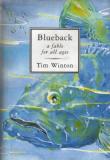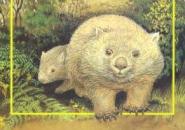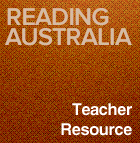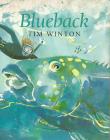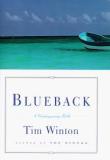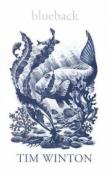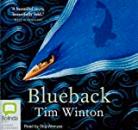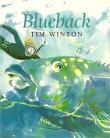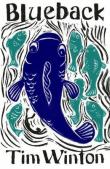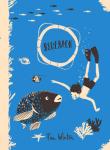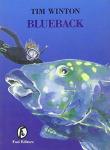AustLit
Latest Issues
AbstractHistoryArchive Description
Adaptations
-
Blueback
1999
single work
drama
'This moving Western Australian story captures the mystery of the sea and majesty of the old fish Abel calls “Blueback”. It is Abel’s journey from inquisitive boy to a man prepared to stand up for what he loves and believes in.
'Blueback is full of underwater imagery and exquisite puppetry, an extraordinary celebration of the West Australian coastline from one of WA’s most beloved authors.'
source: Spare Parts Puppet Theatre.
-
form
y
 Blueback
( dir. Robert Connolly
)
Western Australia
:
Arenamedia Pty Ltd
Minderoo Pictures
,
2022
23358274
2022
single work
film/TV
Blueback
( dir. Robert Connolly
)
Western Australia
:
Arenamedia Pty Ltd
Minderoo Pictures
,
2022
23358274
2022
single work
film/TV
Reading Australia
This work has Reading Australia teaching resources.
Unit Suitable ForAC: Year 7 (NSW Stage 4)
DurationFour to six weeks
Curriculum Summary
Find a summary table for Australian Curriculum: English content descriptions and NSW Syllabus outcomes for this unit.
Themes
connection to place, connection to the natural world, family, greed, resilience, the environment
General Capabilities
Critical and creative thinking, Ethical understanding, Information and communication technology, Intercultural understanding, Literacy, Personal and social
Cross-curriculum Priorities
Aboriginal and Torres Strait Islander histories and cultures, Sustainability
Notes
-
Included in the 1998 White Raven's Catalogue compiled by the International Youth Library in Munich, Germany. Special mention.
Affiliation Notes
-
This work is affiliated with the AustLit subset Asian-Australian Children's Literature and Publishing because it has a Japanese translation.
Publication Details of Only Known VersionEarliest 2 Known Versions of
Other Formats
- Braille.
- Sound recording.
- Large print.
Works about this Work
-
Hollywood Stars to Lead Tim Winton Film Adaptation of Blueback
2021
single work
column
— Appears in: ABC News [Online] , February 2021;'Filming is underway in Western Australia's Bremer Bay for a movie adaptation of a popular Australian novel, with directors today revealing three Hollywood stars are set to star on the south coast.' (Introduction)
-
WA's Movie-making Boom Continues with Film Adaptation of Tim Winton's Blueback
2020
single work
column
— Appears in: ABC News [Online] , January 2020;'A film adaption of Tim Winton's award-winning 1998 young adult novel Blueback is the latest in a string of movie productions in Western Australia, with filming slated to begin on the state's south coast by mid year.' (Introduction)
-
y
 Teaching Classic Australian Children's Fiction
Anthony Shaw
,
St Lucia
:
AustLit: The Australian Literature Resource
,
2016-
15827758
2016
website
prose
Teaching Classic Australian Children's Fiction
Anthony Shaw
,
St Lucia
:
AustLit: The Australian Literature Resource
,
2016-
15827758
2016
website
prose
This Exhibition is a collection of extensive teaching resources for classic Australian children's texts. The resources are aimed at upper primary school and lower high school teachers. The collection forms part of Anthony Shaw's Learning with Literature program.
-
Australia : An Inescapable Cultural Paradigm? Cross- and Transcultural Elements in Tim Winton’s Fiction
2016
single work
criticism
— Appears in: Journal of the European Association for Studies on Australia , vol. 7 no. 2 2016; (p. 30-40) 'The article considers Tim Winton’s fiction in terms of its cross- and transcultural character. Despite the fact that local Australian settings permeate the writer’s narratives, Winton creates an imaginary space that is both local and transnational in terms of its quality of the domestic culture, which Winton extends beyond its original field of practice. Winton achieves the transcultural quality of his fiction through transgressions and boundary breaking that are possible due to his frequent reworking of the traditional Australian themes and concepts of the unknown, supernatural, mystical, numinous and sacred, exploitation of leitmotifs of journey, transit and in-betweenness, use of cross-cultural symbols as well as various utopian and dystopian topoi such as Arcadia and Heimat.' (Publication abstract) -
On Focuses on the Oceans' Ecology Reveled in Tim Winton's Main Literature Works
2014
single work
criticism
— Appears in: Journal of Xihua University , no. 6 2014; (p. 53-55) 'Descriptions and focuses on ocean is a necessary part of the development of Australian literature, on which the world famous Australian writer Tim Winton is considered as one of the representatives. This thesis is mainly to introduce Tim Winton and his representative works which focus on the ocean; the author lists the most influential works of Tim Winton in order to present the common as well as the ecological concept of environmental protection reflected in his works.' (Publication abstract)
-
[Review] Blueback
1998
single work
review
— Appears in: Reading Time : The Journal of the Children's Book Council of Australia , vol. 42 no. 1 1998; (p. 23-24)
— Review of Blueback 1997 single work children's fiction -
[Review] Blueback
1998
single work
review
— Appears in: Magpies : Talking About Books for Children , March vol. 13 no. 1 1998; (p. 36)
— Review of Blueback 1997 single work children's fiction -
In Short : Fiction
2009
single work
review
— Appears in: The Sydney Morning Herald , 14-15 February 2009; (p. 30)
— Review of Blueback 1997 single work children's fiction ; Wrong Way, Go Back 2009 single work novel ; The Family Tree 2009 single work novel -
Kids' Lit
2009
single work
review
— Appears in: The Weekend Australian , 28 February - 1 March 2009; (p. 10)
— Review of Blueback 1997 single work children's fiction ; The Remarkable Secret of Aurelie Bonhoffen 2009 single work children's fiction -
Reading and Viewing : Sustainability Texts
2011
single work
review
— Appears in: English in Australia , vol. 46 no. 2 2011; (p. 93-94)
— Review of Blueback 1997 single work children's fiction -
A Look at... Tim Winton's Places and People
1998
single work
interview
— Appears in: Magpies : Talking About Books for Children , July vol. 13 no. 3 1998; (p. 20-21) -
y
 Mind the Country : Tim Winton's Fiction
Crawley
:
University of Western Australia
,
2006
Z1286107
2006
single work
criticism
Mind the Country : Tim Winton's Fiction
Crawley
:
University of Western Australia
,
2006
Z1286107
2006
single work
criticism
-
Fear, Voice, and the Environment in Sonya Hartnett's Forest and The Midnight Zoo
2011
single work
criticism
— Appears in: Papers : Explorations Into Children's Literature , vol. 21 no. 1 2011; (p. 67-76) 'Subtle is not a word that is normally associated with Sonya Hartnett's style. Rather, she is known for her stark, bold approach. However, when it comes to the Australian environment, Hartnett is indeed subtle in her approach. Hartnett has set in play a new, almost posthumanist style of writing about the nonhuman. The Australian landscape and environment has always figured prominently in Australian literature for both adults and children but Hartnett has taken this writing in a totally different direction. This article looks at two of Hartnett's novels, Forest and The Midnight Zoo, and examines how Hartnett offers new and exciting avenues of thought regarding the place of humans in that environment.' (Author's abstract)
-
Winton Revealed
1997
single work
criticism
biography
— Appears in: The Weekend Australian , 25-26 October 1997; (p. rev 26)
— Appears in: Dining Out with Mr Lunch 1999; (p. 96-101) -
Water
2014
single work
criticism
— Appears in: Tim Winton : Critical Essays 2014; (p. 16-48)'In Dirt Music, remembering the time before a car crash took the lives of his brother Darkie, Darkie's wife Sal, and their two children, Bird and Bullet, Luther Fox recalls Bird's question : 'Lu, how come water lets you through it?' Bird is the one who saw God, and 'if anyone saw God it would likely be her. Bird's the nearest thing to an angelic being.' Bird's question suggests the function of water in Winton's novels. Water is everywhere in his writing, as people sail on it, dive into it, live on the edge of it. Clearly the sea and the river are vital aspects of the writer's own experience. But water is more than an omnipresent feature of his writing and his life, the oceanscape of his stories. It is something that 'lets you through'. It lets you through because it is the passage to a different state of being, sometimes in dream, sometimes in physical extremity, but always offers itself as the medium of transformation. When it lets you through - whether to escape to a different life, as a rite of passage to adulthood, to see the world in a new way or to discover the holiness of the earth or the wonder of the world, whether it is the baptismal water of redemption to an opening to a world of silence - and it is all these things- you become different.' (Author's introduction 16)
Awards
- 1999 winner West Australian Young Readers' Book Award — Hoffman Award
- 1999 shortlisted New South Wales Premier's Literary Awards — Ethel Turner Prize for Young People's Literature
- 1998 winner The Wilderness Society Environment Award for Children's Literature — Senior Fiction
- 1998 shortlisted Australian Booksellers Association Awards — Booksellers Choice Award
- 1998 winner West Australian Young Readers' Book Award — Hoffman Award
- Coast,
- Western Australia,

